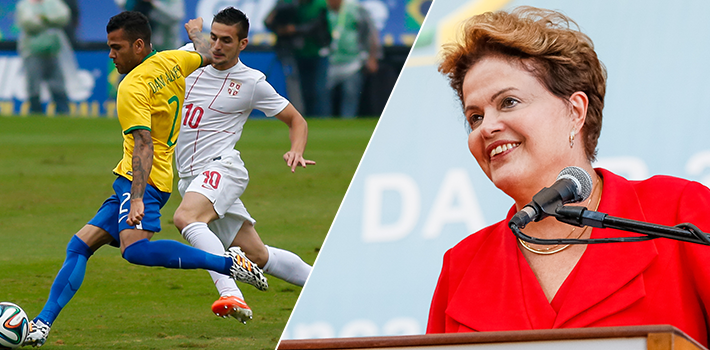
EspañolThe euphoria shown by Brazilian president Luiz Inacio Lula da Silva in 2007, when Brazil was selected to host the 20th World Cup, ensuring Brazil would host the tournament for the second time since 1950, appears to have been left far behind. And the tears shed by Lula in 2009 when he heard the decision by the International Olympic Committee announcing Río de Janeiro as the host for the 2016 Olympics seem to be even further behind.
Current President Dilma Rousseff is making every effort to appear happy on the eve of the World Cup. There are rumors in the country that she has even had to resort to the great Pelé. In recent public statements, he has vehemently denied any pessimism among Brazilians about the World Cup, and has made a call to “not mix up” political problems or the “corruption” in the country with the image of the Brazilian team.
However, the concerns of the Rousseff administration are evident, and there is every reason for them to feel this way. There have been a series problems with organizing the event and massive protests in response to the expenditure of public funds and the allocation of resources, especially in the construction of 12 additional stadiums. The government has reportedly spent US$11.5 billion in preparing for the tournament, while inflation and unemployment rates rise each day. According to a poll by Datafolha, “In 2008, 78 percent of Brazilians agreed with their country hosting the World Cup, but now only 49 percent are in agreement. In 2013, 48 percent thought the Cup would bring benefits to the country, while only 36 percent still agree in 2014.”
Analyst Rubén Aguilar Valenzuela is correct in saying that the civil unrest in the country is directed at the government and not the Brazilian national team. However, the World Cup itself has become a symbol of unfulfilled social policy promises. It is also true that the employees of the San Paolo metro decided to suspend the strike first held five days ago in order to not obstruct the World Cup’s opening day, but they still threatened to resume striking if the 42 workers who were fired from their jobs are not rehired.
All evidence indicates it will be very difficult for the government to maintain sufficient public order for an entire month for the games to proceed peacefully and for Brazil’s image as an emerging power, with Dilma Rousseff as leader, to improve. Although in the latest polls the president is still the favorite to win the election, she may do so with no more than 35 percent of the vote.
There is no doubt that a Brazilian victory or a high rank in the World Cup, in addition to the event running well logistically, would be favorable for the president. It may even go further than the formal support that she has already received from the Brazilian Democratic Movement Party (PMDB) and Democratic Labor Party (PDT) in her bid to be reelected come October 5. Making the 2014 World Cup the “World Cup of World Cups,” as Rousseff has said, could help her declining popularity. It’s yet to been seen, however, if even a victory in the World Cup would last her until October.
As Rogelio Nuñez has rightfully pointed out, if Brazil has only a “mediocre World Cup performance filled with difficulties and shortcomings that damage the celebration of the event, the international image of Brazil would suffer. It would no longer be the Latin-American country ‘in style.’ It would be an even bigger blow for Dilma Rousseff. In the event she is reelected, she will be a much weaker president than she was in her first term.”
In any case, beyond the World Cup, the Lula-Rousseff socialist project in Brazil, like the Castro-Chavista project in Venezuela, is weakening rapidly, which puts its historic ambition of becoming a regional and world power in danger.
 Versión Español
Versión Español












